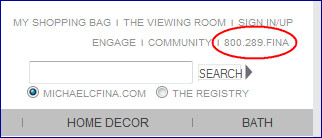What NOT To Do On Local Business Websites
There’s lots of advice out there for what to do in optimizing websites for local businesses, yet day after day, we see some of the same bad practices continue to be perpetuated in bad web designs. So, at the risk of sounding like a broken record, here’s a reminder of some basic things NOT to do […]
There’s lots of advice out there for what to do in optimizing websites for local businesses, yet day after day, we see some of the same bad practices continue to be perpetuated in bad web designs. So, at the risk of sounding like a broken record, here’s a reminder of some basic things NOT to do if you want your local business site to perform well with search engines and consumers.
 Don’t Use Vanity Numbers
Don’t Use Vanity Numbers
At all! Vanity phone numbers are those jazzy, personalized phone numbers that use letters instead of mere numbers, usually to spell out some tagline or a business’s name.
These may have come into vogue back in the 1960s or 1970s, and they seemed to work well by providing a mnemonic by which consumers could remember a company’s phone number.
Fast forward to 2011, though, and many cellphones don’t include the letters on the numeric keypads anymore — making it difficult to peck out the phone number if you only recall the vanity version.
Worse yet, it makes it impossible for search engines to associate your phone number on your site with your business listing, and it could impair your SEO. So, vanity numbers = bad for both search engines and customers!
Don’t Put Your Local Phone Number Within A Graphic Image
Designers often wish to use prettier text fonts than what they can achieve through straight HTML, but doing this can shoot you in the foot if this is the only way your local business phone number is included in your site.
For best performance, at least make sure the image containing the phone number includes the number in the image tag’s “ALT” text, and include it elsewhere on your webpage in regular HTML text as well.
Don’t Forget To Update Your Copyright Date
We’re now halfway through 2011, so your site shouldn’t still be showing “2010” or “2009” in page footers. Worse yet, it really shouldn’t still be saying 2003! Never updating your dates will make your site start looking stale to search engines and prospective customers.
Avoid Making A Flash-only Website
It’s okay to have some parts of your webpages done in Flash, for example, if you’d like to have an animated banner below your header. But, if your whole website is in Flash, or your main site navigation, it still doesn’t perform well for search engines. Not only that, it won’t work for some mobile phones, and it won’t get properly interpreted to be shown through Google Instant previews, either:
…
Don’t Use “Click Here” For Your Link Text

Don’t Let Your Website Sit Vacant
Sites sporting “Under Construction” or “Coming Soon” messages for their homepages are only good for ranking badly. Why would you want to send a message to search engines that you might not be opened for business yet? Do what it takes to go ahead and roll out your website, at least with the bare minimum information – including business name, location and local phone number.
Don’t Let Your Homepage Serve Up An Error Or Let Your Domain Expire

When your business website shuts down, Google may drop your listing in the SERPs to make it less likely they’ll be suggesting erroneous listings to consumers. As such, make a point of visiting your website at least once every few weeks to make sure it looks right.
Don’t Neglect To Pay Your Site Designer Or Host
This should be a no-brainer, but if you don’t pay what you owe, it could result in an error page as described above. Or, worse yet, it could result in your designer messing up your online reputation like this business owner who skipped on his bill:
Don’t Allow Music To play By Default On Your Website
…or we’ll never visit it again. I stole this recent suggestion from Lisa Barone, because it makes me crazy! Half of those of us searching on the Internet are already listening to music we really prefer, so your webpage’s tune is going to interfere with that. The other half of us are surfing from work, and we’d prefer not to so blatantly obvious that we’re looking at your site instead of finishing some report.
Don’t Put Addresses & Phone Numbers In Fine Print
And don’t have them only appear only at the bottom of your webpage. Here’s one extreme example – this site has overly many links in its footers, and they made the smallest, finest print on the page to be their office locations/addresses/phone numbers:
The small print is also barely contrasted with the background color, too. This fine text at the bottom of webpages is not good for usability and not good for your site’s search-engine-friendliness.
Historically, some site owners would cram links and/or keywords into the footers of webpages, in fine print and even making the text color match the background to render it invisible to human visitors. As a result, Google and other search engines are now more sensitive to lots of links and text in fine print which contrasts poorly with the backgrounds on webpages. Avoid doing this.
Keep these various recommendations for “What Not To Do” off of your local busines website, and you’ll make both consumers and search engines happy.
Contributing authors are invited to create content for Search Engine Land and are chosen for their expertise and contribution to the search community. Our contributors work under the oversight of the editorial staff and contributions are checked for quality and relevance to our readers. The opinions they express are their own.
Related stories



